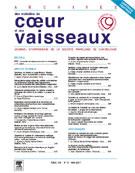05-44 - AMLODIPINE IMPROVES AORTIC VALVE FUNCTION IN AN EXPERIMENTAL MODEL OF AORTIC VALVE SCLEROSIS: AN ULTRASOUND STUDY - 09/04/08
Richardson Lobbedez [1],
Sylvestre Maréchaux [2],
Delphine Corseaux [2],
Alexandre Ung [2],
Sebastien Pouwels [2],
Anne-Sophie Polge [2],
Olivier Dascotte [2],
Christophe Zawadzki [2],
André Vincentelli [2],
Ghislaine Deklunder [2],
Brigitte Jude [2],
Thierry Le Tourneau [2]
Voir les affiliationsObjectives: Aortic valve sclerosis (AS), considered as an atherosclerosis-like process, is the most common valvular heart disease in the elderly. Tissue factor (TF), an important component of atherosclerotic lesions, is present in AS lesions. Amlodipine, a calcium channel inhibitor, is thought to have anti-atherosclerotic properties, and might therefore limit AS progression. We sought to evaluate the effect of amlodipine on valve function, valvular atherosclerotic lesions, and TF expression in an experimental model of acquired aortic valve sclerosis, in rabbits fed with a high cholesterol diet and supplemented with vitamin D2.
Materials and methods: 51 rabbits were separated in a control group (Ctrl, n = 16) and a group fed with a cholesterol-enriched diet plus vitamin D2 for 12 weeks (n = 35). The latter was randomized at 6 weeks in 2 groups, either treated by 5 mg/kg/day of amlodipine (Amlo, n = 18) or not (Placebo, n = 17). The aortic functional impairment was studied using the permeability index measured by Doppler. Left ventricular mass (LVM) was also determined. Valvular lesions were assessed by histological and immunohistochemical analysis (RAM-11, Lipid infiltration, CD-31, TF) and TF activity was evaluated in valvular tissue and mononuclear cells.
Results: Valve function assessed by the use of permeability index improves significantly under amlodipine (0,6 ± 0,02 vs 0,5 ± 0,03, p = 0,025). LVM was not different between the 2 groups (4,9 ± 0,2g vs 5,1 ± 0,2g, p = 0,85). Lesions thickness and lesion to valvular thickness ratio decreased under amlodipine compared with the untreated AS group (0,25 mm ± 0,10 vs 0,34 mm ± 0,03, p = 0,05 et 0,70 ± 0,02 vs 0,80 ± 0,02, p = 0,001 respectively). Immunohistochemical analysis demonstrated a decrease in macrophages and lipid infiltration. Valvular and circulating TF activity were not different between the 2 groups (p = 0,90 and 0,87 respectively).
Conclusion: Amlodipine significantly improves aortic valve function and decreases aortic sclerosis lesions size in this rabbit model. However, we do not find significant modification of valvular and circulating TF activity. Amlodipine could present a therapeutic interest at an early stage of the disease. Further experimental and clinical studies are needed to confirm our findings.
© 2007 Elsevier Masson SAS. Tous droits réservés.
Vol 100 - N° 12
P. 1083 - décembre 2007 Retour au numéroBienvenue sur EM-consulte, la référence des professionnels de santé.

